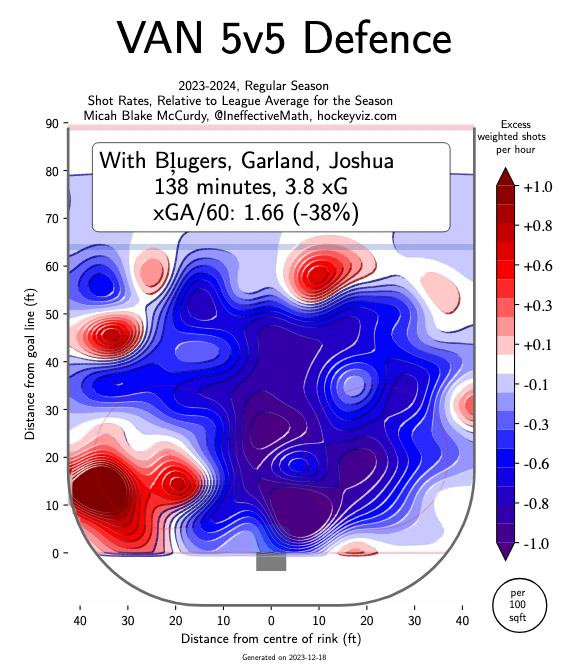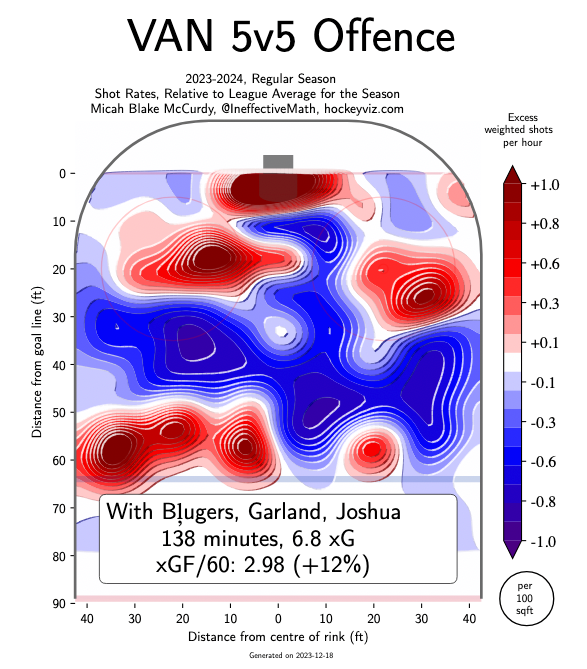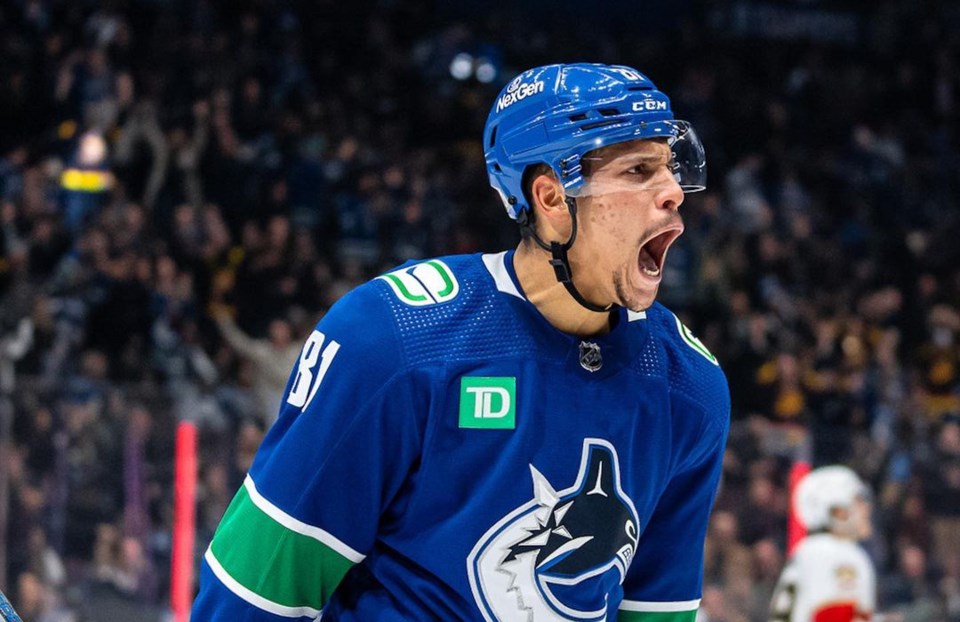Â鶹´«Ã½Ó³»Canucks head coach Rick Tocchet has shaken up most of his forward lines over the past couple of weeks.
Andrei Kuzmenko has had his ice time slashed as he’s been bumped from Elias Pettersson’s line in favour of Sam Lafferty, though in the last couple of games Pius Suter has moved up to that line instead. Nils Höglander has earned an opportunity alongside J.T. Miller and Brock Boeser, bumping down Phil Di Giuseppe, sometimes completely out of the lineup. This has led to all sorts of changes to the fourth line.
Through it all, however, one line has remained consistent: the third line of Conor Garland, Teddy Blueger, and Dakota Joshua.
I like to refer to Garland, Joshua, and Blueger as the Good Job Boys, partly because that uses the first letter from each of their last names but also because that’s the phrase they’re most likely to hear when they return to the bench after a shift.
While the Canucks’ other lines have struggled from time to time, the Good Job Boys have been incredibly consistent game after game, doing exactly what a third line should do: play well defensively, forecheck hard, and possess the puck.
"Hashmarks down is where they're at their best," said Tocchet. "Dakota, the way he's been playing for us, you get a lot of loose pucks, and then Garland's feeding off them from the hashmarks down. And then Teddy plays that safety valve for us. I think it's a chemistry line, where hashmarks down, they're really good. That's where they get a lot of their chances.”
“When we do game reviews, very rarely is that line on in our D-zone making mistakes — they're pretty mistake-free," he added.
That’s what that line has zeroed in on this season: playing mistake-free hockey in the defensive zone and pushing possession into the offensive zone.
“We start a lot in the D-zone but we finish a lot in the O-zone,” said Garland after a game against the Minnesota Wild. “That’s usually a good sign for us that we’re playing the right way. We just try to make it hard on whoever’s out there as a line and try to tire some teams down so our top guys can get out there.”
The Good Job Boys have been doing this so consistently that they stuck together as a line even when they weren’t picking up points. Even that has changed in recent games, as they’ve started chipping in secondary offence — much-needed in a few games where the team’s stars were struggling.
In the last seven games, Garland and Blueger both have five points, while Joshua has chipped in four goals and six points.
But, as Garland says, the points are not the point.
“I think we’ve had success for a while. It’s just sometimes when you get points, I think people think you’re playing better,” said Garland, adding, “Winning is more fun [than scoring]. I’ve scored a lot in my career but I’ve never really gone deep in the playoffs. I would enjoy that a little more.”
That success has shown up in the line’s underlying numbers.
Garland leads the Canucks in several advanced statistics at 5-on-5, according to Natural Stat Trick: corsi percentage, fenwick percentage, expected goals percentage, scoring chance percentage, and high-danger chance percentage. In other words, Garland has been the team’s best player at out-shooting and out-chancing the opposition at 5-on-5.
Those results come from Garland's incredible puck possession game, particularly along the boards where the undersized winger consistently comes out of puck battles with the puck. He's incredibly shifty and slippery, constantly creating advantages even when up against much larger opponents.
But it’s not just Garland. The Good Job Boys as a whole have sterling underlying numbers, particularly when they’re together.
Garland, Joshua, and Blueger lead all Canucks forwards in the lowest rate of high-danger chances against at 5-on-5, as they’ve been exceptional at protecting the most dangerous areas of the ice in the offensive zone. They don’t just compare favourably to other Canucks — they compare favourably to other lines around the NHL.
Among the 72 forward lines that have played at least 100 minutes together at 5-on-5, the Good Job Boys rank 13th in expected goals percentage according to .
That compares favourably to top lines around the league, like the Aleksander Barkov line with the Florida Panthers or the Sidney Crosby line with the Pittsburgh Penguins. With the caveat that the Good Job Boys don’t regularly face an opponent’s top lines or defence pairings, they’ve been dominant in the minutes they’ve been given.
This heatmap from HockeyViz of defensive zone shot attempts with Garland, Joshua, and Bluegers on the ice is legitimately bonkers. They allow absolutely nothing from the middle of the ice and the largest source of shots is from the left corner near the boards.

Meanwhile, when we look at the heatmap of the offensive zone the Good Job Boys create shots in the offensive zone, they’re primarily coming from the inside of the left faceoff circle or the sea of red on top of the crease.

It's no wonder the Good Job Boys have stuck together as a line. Even before they started contributing points on the scoresheet, they were contributing significantly in so many other ways.
“It’s just sticking to the system,” said Garland after Sunday’s game. “The coaches give you a gameplan before and if you trust it, it’s going to work. We just try to play the right way each and every night and if pucks go in, they go in. Just a good defensive line that can chip in from time to time.”




